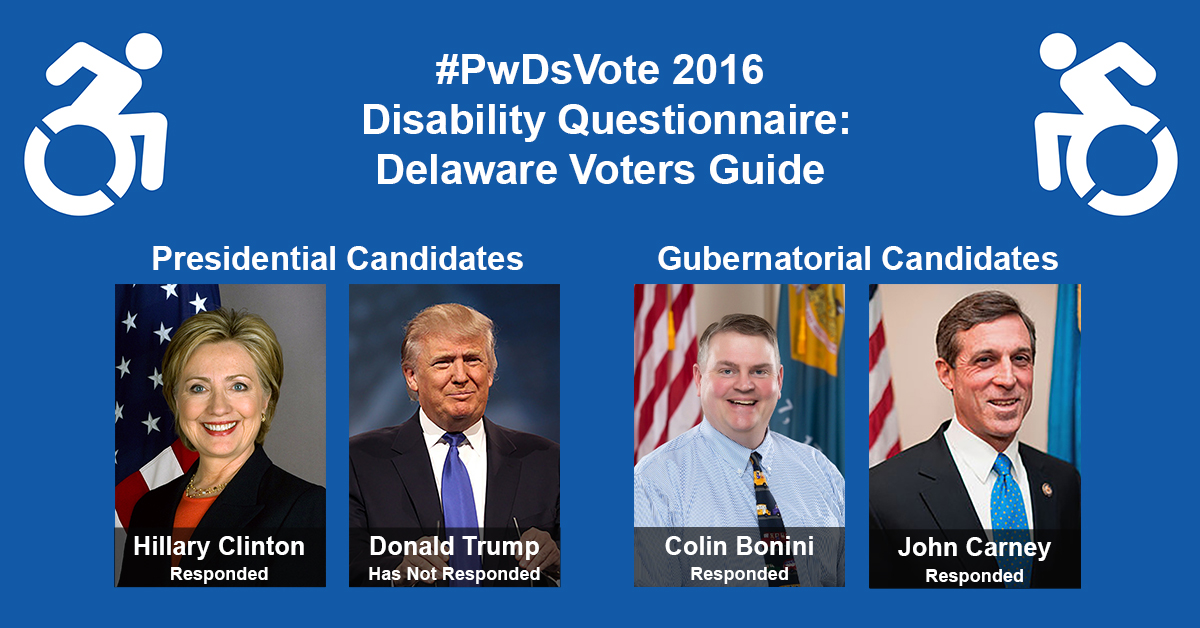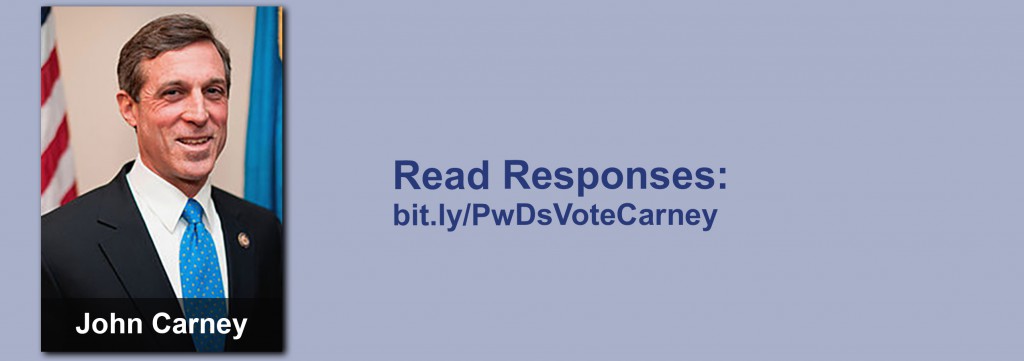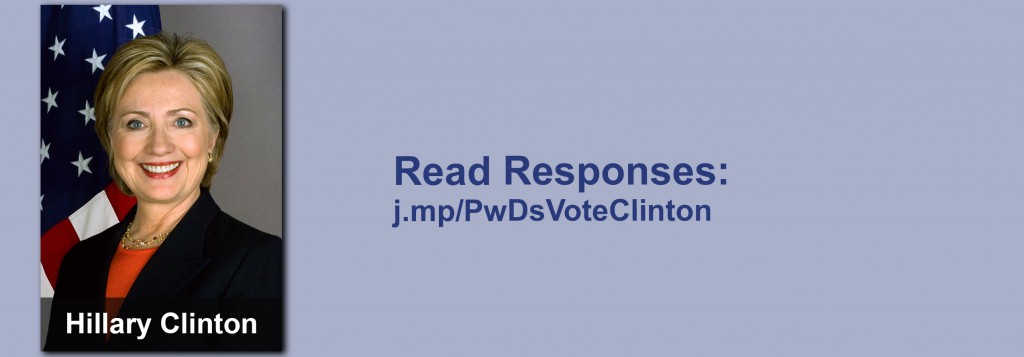Washington, Oct. 19 – As voters get ready to head to the polls in Delaware, RespectAbility has released its Delaware Disability Voter Guide for the upcoming gubernatorial and presidential races. Republican state Sen. Colin Bonini and Democratic Rep. John Carney are competing to become Delaware’s next governor. Whomever wins will have big shoes to fill as current Delaware Gov. Jack Markell, who is term limited, is a hero to the disability community. Markell was awarded recognition by RespectAbility this summer for his leadership nationally in creating more job opportunities for people with disabilities.
Bonini and Carney, as well as presidential candidate Hillary Clinton, all have completed the #PwDsVote Disability Campaign Questionnaire for people with disabilities. Because of that, Delaware’s 109,763 citizens with disabilities now have a chance to compare them on a variety of key issues.
The #PwDsVote 2016 Campaign Questionnaires were designed by and for people with disabilities (PwDs) and those who love them to know where candidates stand on key issues. RespectAbility is nonpartisan and does not endorse candidates. The questionnaires are purely for educational purposes as voters go to the polls.
The presidential questionnaire was created during the primary season and asked all of the presidential candidates to comment on 16 disability questions. Former Secretary of State Hillary Clinton responded by addressing all of the questions. Despite numerous requests in person and by phone and email, the Trump campaign has not yet filled out the questionnaire. The American Association of People with Disabilities and the National Council on Independent Living also has a nonpartisan presidential questionnaire, which both Clinton and Trump have completed. Libertarian Gary Johnson and Green Party candidate Jill Stein have not filled out either questionnaire but Stein recently did speak about disability issues during a campaign stop in Texas.
The down-ballot survey was adapted from the presidential questionnaire to ask gubernatorial candidates 16 questions and senatorial candidates 17 questions. All answers are posted verbatim and in full on The RespectAbility Report, a publication that covers the intersection of disability and politics.
Eleven candidates for governor, as well as 26 candidates for senate, from both sides of the aisle (22 Democrats, 14 Republicans, 1 Green Party) completed the down ballot questionnaire, showing that disability rights is a nonpartisan issue. An additional nine candidates responded that they are not completing any questionnaires during this campaign season. The responses also are geographically-diverse, coming from states all around the country, as politicians are paying more and more attention to the disability community.
Delaware ranks 28th in the nation for employment of people with disabilities, as 35.6 percent of the working-age people with disabilities in Delaware have a job. However, there is still work to be done to improve outcomes for people with disabilities. The upcoming election and the implementation of the Workforce Innovation and Opportunity Act (WIOA) will continue to increase opportunities and employment for people with disabilities, and voters need to know where candidates stand on the issues.
In his responses, Bonini said reducing and removing stigmas surrounding people with disabilities should start with employers.
“Reducing stigma must begin by highlighting Delaware-based employers who best showcase the benefits of hiring people with disabilities and recruiting diverse talent to meet employer needs,” he explained. “The best way to fight stigmas is to let employers see the facts from other employers who are already succeeding by hiring people with disabilities.”
Carney also responded, explaining that all businesses can benefit from hiring people with disabilities.
“These employees are often very grateful for the opportunity, eager to learn new skills, and extremely hardworking — qualities that every employer wants in those they hire,” he said. “The state of Delaware has been a national leader in hiring people with disabilities and as governor, I would expect this to continue.”
Fully one-out-of-five voters have a disability, and 52 percent of likely voters have a loved one with a disability. Only 34 percent of working-age Americans with disabilities have jobs, despite the fact that the vast majority want to work. More than 11 million working age people with disabilities are now living on government benefits in our country.
RespectAbility President Jennifer Laszlo Mizrahi said, “It is vital for us to know where the candidates stand on the disability aspects of economic, stigma, education, safety, transportation, housing, healthcare, foreign affairs, criminal justice and other issues. Candidates have hugely different ideas about how to deal with the issues. Thus, it’s extremely important to read their full answers so you can understand their vast differences. Given the outstanding work done by Markell and his team on disability issues, the newly elected governor will have good plans and practices in place that will help people with disabilities in Delaware going forward.”
Delaware Leadership Prioritizes Disability Employment
There are 55,633 Delawareans with disabilities who are between the ages of 18-64. Additionally, there are 3,800 Delawareans ages 16-20 with disabilities. More than 16,000 Delaware students have individual education plans (IEPs). However, many Delawareans with disabilities have not yet received a disability diagnosis they need, and thus are not yet receiving the school accommodations and supports that they need to succeed. Many students who might need support to succeed academically instead find themselves trapped into a lifetime of poverty or flowing down the school to prison pipeline.
Delaware is 28th among states when it comes to the employment of people with disabilities. There are 55,633 people with disabilities between the ages of 18 to 64 in Delaware and 35.6 percent of them are employed. Additionally, there is still a 40.7-point gap when you consider the 76.3 percent of people without disabilities in Delaware who are working. There are 3,800 youth between the ages of 16-20 with disabilities in Delaware. Each year a quarter of them will age out of school and because of your state’s hard work, they have increasing chances to find success in the working world. Governor Markell’s leadership has left a great foundation to build on by continuing the effort to show case the business case for hiring people with disabilities.
RespectAbility, founded in 2013, is a nonpartisan, nonprofit organization working to end stigmas and advance opportunities for people with disabilities. It has submitted comments for all 50 state’s drafts of the Unified Plan as required under Section 102 of WIOA. Delaware’s commitment to people with disabilities is evident throughout the written state plan. The Plan as written will significantly improve Delaware’s workforce system and its ability to serve people with barriers to employment. Delaware may be a small state, but it has had a substantial positive impact nationally. Under the new WIOA plan, with strong leadership and implementation, people with disabilities will be ever-increasingly contributing members of their communities in new and better ways. This will strengthen the economy for all people in Delaware.
One of the most important facets of WIOA is that it raises expectations for youth with disabilities and assists states to provide them with the supports they need to ensure success. Indeed, as Delaware’s Baby Boomers retire and the state’s economy evolves, employers are starting to experience increasing talent shortage. Delawareans with disabilities are an untapped resource that can be trained to bridge that gap. Indeed, a recent detailed study by the Kessler Foundation and the University of New Hampshire shows the 70 percent of working age people with disabilities are striving for work.
Evidence shows that people with disabilities can provide a wonderful solution to companies and other employers that want to succeed. The diverse skills, greater loyalty and higher retention rates of people with disabilities are already starting to meet employer talent needs in increasing numbers around America. With WIOA, Delaware can benefit from that progress if it truly breaks down silos within government agencies and partners, and lets innovation, based on evidence-based practices, take place.
However, the gap in the labor force participation between people with and without disabilities is still too large around the entire country. This lack of employment for people with disabilities creates poverty, powerlessness, and poor health. Polls and studies show that people with disabilities want the opportunity to have the dignity and independence that jobs provide.
America has 1.2 million youth with disabilities, between the ages of 16 and 20. Each year 300,000 of them age into what should be the workforce, but stigmas and lack of knowledge about the capabilities of people with disabilities means that most do not find employers willing to hire them. Young adults with disabilities in all of these states are hoping to find work. They have high expectations and deserve the opportunity to achieve the American dream. Young people with disabilities may simply need some thoughtful help to transition into the workforce. See data on all 50 states here: State Data.
According to a new report from Rutgers University, 35.4 million people with disabilities will be eligible to vote in the November 2016 elections, representing close to one-sixth of the total electorate. That’s an increase of nearly 11 percent since 2008.
Remember to Vote
Delaware residents can vote for the candidates of their choice either on the standard voting schedule or through absentee ballots. Delawareans had until Oct. 15, 2016, to register to vote for the presidential general election. More information concerning voting can be found at: Voting in Delaware. If Delawareans are registered voters and are unable to vote in person on Election Day, they may be eligible to vote by absentee ballot. Voters have until Nov. 7, 2016 to vote by absentee ballot. You can vote in person or through the mail. More information regarding absentee ballots and the application can be found at: Voting by Absentee Ballot.







Be First to Comment